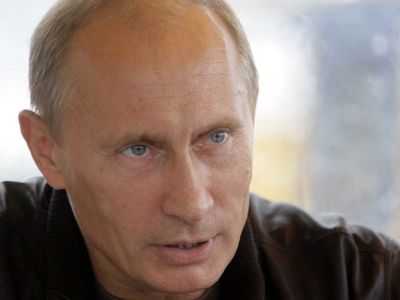While Washington and Paris announced - without a mandate from the Security Council - that they were preparing to attack a sovereign state and member of the United Nations, Moscow chose first of all to open a diplomatic dialogue, and then to address the people of the United States directly. This unprecedented approach is the best way to avoid rising tension. So what were the Russian President’s arguments?

In an op ed column published by the New York Times on the 12th September, Russian President Vladimir Putin explained his vision of potentially new forms of international relations arising from the Syrian crisis [1].
• First of all, he underlined his attachment to the UN, and his desire to re-integrate the United States into the organisation – who, since the NATO aggression of Yugoslavia in 1999, have ignored it. He observed that the world directorate, composed of the five powers which dispose of a veto, guarantees the stability of the system at the cost of a freely-accepted limitation of power. International law is founded on this acceptance.
• Then he described the war in Syria as a war between the government and a religiously-defined opposition organised around foreign combatants who claim they are fighting for Al-Qaeda. On this point, he insists on the fact that the war in Syria is not being fought for democracy, and indeed, that it is not a goal for either side.
• Concerning the use of chemical weapons on the 21st August, he confirms his conviction that it was carried out as a false-flag operation by the armed opposition in order to provoke an international crisis and military intervention against the Syrian government. He adds that he is in possession of information which indicates that the same opposition forces are preparing a similar operation against Israel. This presentation of the events has since been confirmed by a jihadist who had been taken prisoner by the Syrian army. He revealed on Al-Ikbariya that he had accompanied thirteen missiles from a Turkish army base to Damascus, and that only a few of these missiles had been used [2]. There are therefore others still waiting to be fired.
• Vladimir Putin continues by noting that the systematic use of force by the United States creates a general climate of insecurity. Since they can no longer depend on the law to defend them, an increasing number of states are planning to acquire atomic weapons, and this will only reinforce insecurity in a sort of vicious circle. In the same way, the support given by Western powers to foreign jihadists in Syria increases insecurity not only in this part of the world, but also in the West itself, because these terrorists will end up going home and engaging in conflict with their own society. In both cases, the strategy of the United States, which may seem proficient at first glance, can not fail to turn against them.
• Finally, he concludes with a frontal attack on the ideology of his US counterpart. He denounces « American exceptionalism », which assumes that this great nation is of a different nature than others, and is tasked more than any other with the reign of world justice. This form of jingoism, which corresponds to the conceit of being the only hyper-power, exisiting above and beyond the Security Council and international law, is in itself a source of conflict that no human being can accept.
By this op ed column, Vladimir Putin reveals the thrust of his politics – to force Washington to recognise that it is not, or is no longer, the master of the world, and to bring it back to the level of the other great powers of the Security Council, in acceptance of the rules of international law. The Syrian crisis seems to indicate that he has succeeded, since the US, for the moment at least, has abandoned the idea of attacking Syria in defiance of international law. In this way, Russia will therefore have assumed the role of counter-balance, which used to be the position of the Soviet Union. US domination of the world will therefore have ceased after a period of 18 years, counting from its rearmament (1995) to its defeat in Syria (2013).
Besides this, the Russian President is working to help Washington to extricate itself from the Syrian problem by redefining it – the Syrian government is not enaged in a war against democracy, but is fighting to defend the freedom of opinion which is threatened by the fanaticism of Al-Qaeda and its allies. Consequently, it is in the interest of the members of the Security Council to support the Syrian state in its struggle against international terrorism.
The ball is now in the US court. President Barack Obama has not yet replied to this op ed, despite the demands which have been formulated by the Russian press. We may therefore suppose that he admits the validity of Vladimir Putin’s point of view, even though he may not necessarily accept it. In any case, by engaging the US and international public directly, the Russian President has discredited Washington’s bellicist policies, and has taken a step for peace.
[1] “A Plea for Caution From Russia”, by Vladimir Putin, New York Times/Voltaire Network, 12 September 2013.
[2] “The chemical weapons of Ghouta came from the Turkish Army”, Translation Alizée Ville, Voltaire Network, 17 September 2013.

 Articles by this author
Articles by this author Send a message
Send a message



























Stay In Touch
Follow us on social networks
Subscribe to weekly newsletter